Judge Robert J. Shelby of the United States District Court struck down laws prohibiting same-sex marriage in Utah as unconstitutional and ordered the state to immediately cease enforcement of laws that confine marriages only to heterosexual couples. Governor Gary R. Herbert immediately condemned the decision and has expressed that he is determining “the best course to defend traditional marriage within the borders of Utah.
Earlier this month, another court struck down Utah laws that criminalized polygamous unions.
While the Governor wants to challenge the judgment and the attorney general has expressed the state would request a stay of the order pending an appeal, Salt Lake County has already begun issuing marriage licenses to same-sex couples.
The chief deputy clerk for Salt Lake County was recalled from vacation to deal with the situation where same-sex couples kept walking in to have their marriages legalized. The Salt Lake County District Attorney has authorized the clerks to issue licenses until new developments lay down otherwise.
Earlier this week, New Mexico became the 17th state in US to allow same-sex marriages after the New Mexico Supreme Court found bans on same-sex marriage to be unconstitutional, and that the government’s interest in procreation can be addressed without tampering with marriage regulations.
In his 53-page decision, Judge Shelby, an Obama appointee, wrote, “The court holds that Utah’s prohibition on same-sex marriage conflicts with the United States Constitution’s guarantees of equal protection and due process under the law.”
Shelby further observed, “The state’s current laws deny its gay and lesbian citizens their fundamental right to marry and, in so doing, demean the dignity of these same-sex couples for no rational reason.”
Proponents of the laws now declared unconstitutional continue to maintain the position that the laws restricting marriage only between man and woman should have force because they were legally passed by the legislature and backed by votes. This is a classic situation, where democracy – which depends upon the voice of the majority – conflicts with liberalism, which believes in letting the voices of minorities being heard.
The Church of Jesus Christ of Latter-day Saints issued a statement on Friday, after the ruling, observing, “We continue to believe that voters in Utah did the right thing by providing clear direction in the State Constitution that marriage should be between a man and a woman.”













































